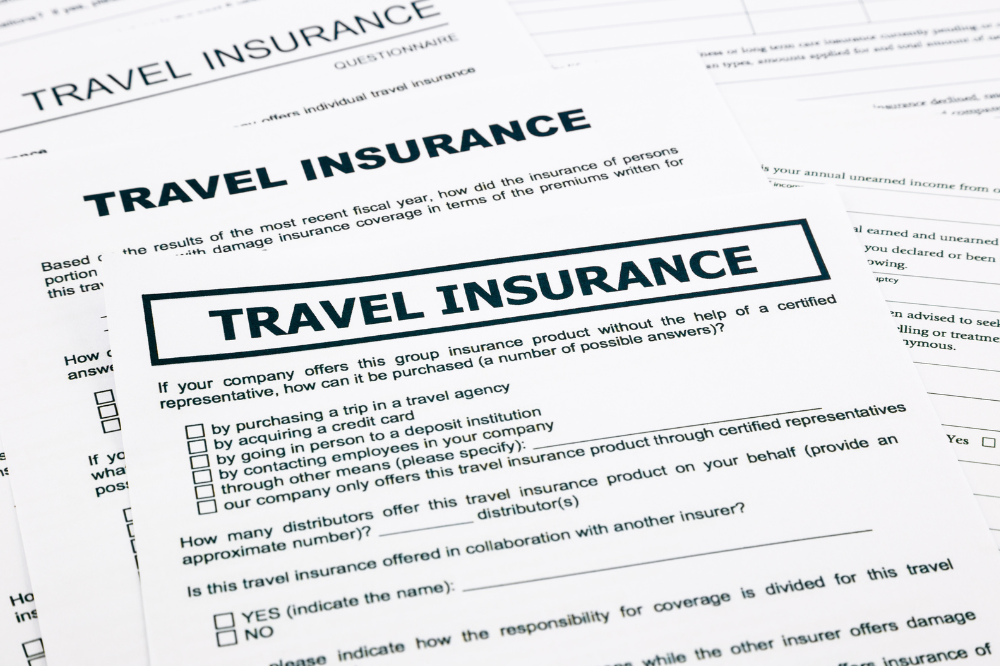What is travel medical insurance?
Travel medical insurance is a type of insurance that provides coverage for medical expenses incurred while traveling. It can cover expenses such as doctor visits, hospital stays, and emergency transportation. Travel medical insurance can be purchased as a standalone policy or as an addition to a health insurance policy. It is important to check with your insurance provider to see what type of coverage they offer and whether it meets your needs.
Who needs travel medical insurance?

There is no definitive answer to this question as different people have different medical needs and travel insurance policies offer different levels of coverage. However, as a general rule, anyone who is planning a trip overseas should consider purchasing travel medical insurance. This is especially important for those business travelers with preexisting medical conditions or who are taking the medication regularly, as they may be more vulnerable to developing illnesses or sustaining injuries while abroad.
Some travel insurance policies also cover emergency medical evacuation, which can be vital if you are traveling to a remote or dangerous location. Again, this coverage is not always included in basic travel insurance policies, so it is important to check with your insurer to see if it is something that you need.
Traveling abroad can be an exciting and enriching experience, but it’s important to make sure you’re properly protected in case of an emergency. That’s where travel medical insurance comes in. Whether you’re traveling for pleasure or business, a good travel insurance policy will provide you with worldwide medical coverage in case you get sick or injured while away from home.
What’s more, if you have to cancel your trip due to an illness or injury, travel insurance can help you recoup some of your non-refundable trip costs. So if you’re planning a trip abroad, be sure to get travel medical insurance – it could end up being the best decision you ever make.
What does travel insurance typically cover?
There is no one-size-fits-all answer to this question, as the coverage provided by travel insurance policies can vary significantly. Usually, it provides two types of coverage primary coverage or secondary coverage. However, most travel insurance policies will offer some combination of the following coverages:
How does travel medical insurance differ from own health insurance plan?

There are a few key ways that travel medical insurance differs from your regular health insurance plan.
First, travel medical insurance is designed to cover you while you are traveling to a foreign country. This means that it will usually have a higher coverage limit than your regular health insurance plan since the cost of healthcare is often higher in other countries. Second, travel medical insurance typically covers a wider range of risks than your regular health insurance plan.
This includes things like emergency medical evacuation and repatriation, which can be very expensive in a foreign country if you need to use them. Finally, travel medical insurance plans often have shorter coverage periods than regular health insurance plans. This is because they are designed to cover you for a specific trip rather than for an extended period.
Trip cancellation and interruption coverage
This type of coverage reimburses you for any non-refundable trip expenses if you have to cancel or interrupt your trip for a covered reason. Covered reasons typically include severe weather, illness, injury, or other unexpected events that prevent you from being able to take your trip.
Medical coverage
Medical coverage provides reimbursement for any medical expenses incurred while on your trip, up to a specified limit. This can include emergency medical evacuation, hospital stays, doctor visits, and more.
Baggage coverage
Baggage coverage reimburses you for any lost, stolen, or damaged baggage or personal belongings while on your trip. This can include items such as laptops, cameras, jewelry, and clothing.
Accidental death and dismemberment coverage
This type of coverage provides a benefit to your beneficiaries in the event of your death or dismemberment while on your trip.
Travel delay coverage
Travel delay coverage reimburses you for any additional expenses incurred due to a delayed flight or other transportation problems. This can include things like meals and lodging.
Missed connection coverage
Missed connection coverage reimburses you for any non-refundable expenses if you miss a connecting flight due to a delayed first flight.
These are just some of the most common types of coverage offered by travel insurance policies. Be sure to read the fine print of your policy to see what types of coverage are included and what is excluded from your policy.
How much does travel medical insurance cost and is it worth the price?

Travel medical insurance typically costs between $30 and $50 per person, per trip. However, the exact cost will vary depending on factors such as the length of the trip, the age of the traveler, and the level of coverage. Some policies also offer additional coverage for things like Adventure Sports or Hazardous Activities, which may cost extra. It’s always a good idea to compare several travel medical insurance policies before purchasing one, to make sure you’re getting the best coverage for your needs.
When deciding if travel medical insurance is worth the price, there are several factors to consider. The most important factor is the type of coverage you need. If you are only planning on traveling for a short period, then you may not need comprehensive coverage. However, if you are planning on traveling for an extended period or to a remote location, then comprehensive coverage may be a good idea. Other factors to consider include whether or not you have existing health insurance coverage and what kind of deductible you are willing to pay.
Some people also choose to purchase travel medical insurance as a way to protect themselves from unexpected medical expenses while abroad. While this can be a good idea, it is important to remember that most regular health insurance plans will not cover medical expenses incurred outside of the United States. Therefore, if you are planning on traveling to a foreign country, it is important to purchase a policy that specifically covers medical expenses in that country.
Ultimately, whether or not travel medical insurance is worth the price depends on your individual needs and circumstances. If you are only planning on traveling for a short period, then you may not need comprehensive coverage. However, if you are planning on traveling for an extended period or to a remote location, then comprehensive coverage may be a good idea. Other factors to consider include whether or not you have existing health insurance coverage and what kind of deductible you are willing to pay.
Types of travel medical insurance and their appropriate use

There are a few different types of travel medical insurance, and each has its own best use. For example, some policies are better for those who are older or have preexisting medical conditions, while others may be better for those who are traveling to more remote or dangerous areas. Here is a brief overview of some of the most common types of travel medical insurance:
Travel health insurance:
This type of policy is designed to cover medical expenses incurred while traveling, including emergency medical care, hospitalization, and evacuation. It can be purchased as an individual policy or as part of a group plan.
Medical evacuation health coverage:
This type of policy covers the cost of transportation and treatment in the event of a medical emergency. It is often purchased as an add-on to a travel health insurance policy.
Trip cancellation insurance:
This type of policy reimburses you for the cost of your trip usually an international trip if you have to cancel due to a covered reason, such as sickness or injury. It can also cover lost baggage and other expenses.
Trip interruption insurance:
This type of policy covers the cost of your trip if you have to interrupt it due to a covered reason, such as sickness or injury. It also covers lost baggage and other expenses.
Adventure sports insurance:
This type of policy is designed for those participating in activities that may be considered risky, such as rock climbing or whitewater rafting. It can cover medical expenses as well as equipment damage or theft.
Emergency medical expenses:
This type of policy reimburses you for covered medical expenses incurred while traveling, up to a set limit. It is often purchased as an add-on to a travel health insurance policy.
Medical emergencies transportation Insurance:
This type of policy covers the cost of transportation in the event of a medical emergency. It is often purchased as an add-on to a travel health insurance policy.
No matter what type of travel medical insurance you purchase, be sure to read the fine print so that you understand what is and is not covered. And always keep your policy information handy in case you need to use it while you are away from home.
What are the benefits of having travel medical insurance?
Following emergency medical benefits are covered by travel medical insurance in case of medical emergencies:
1. You’re covered for emergency medical expenses
2. You’re covered for emergency medical evacuations
3. You’re covered for trip interruption
4. You’re covered for trip cancellation
5. You have access to a 24/7 travel assistance hotline
6. Travel medical insurance plans protect you from financial default of your travel supplier
7. You can purchase insurance for a single trip or multiple trips
8. Insurance can be purchased for domestic or international travel
9. Coverage can be customized to fit your specific needs
10. Some policies include coverage for pre-existing medical conditions
11. Most policies cover children at no additional cost
12. Some policies offer Adventure Sports coverage
13. Most policies provide coverage for lost, stolen, or delayed baggage
14. Many policies offer rental car collision coverage
15. Some policies offer flight accident coverage
What are some things to consider before choosing travel medical insurance?
Before purchasing travel medical insurance, consider your needs and the coverage that is right for you. Make sure to read the policy carefully and understand the terms and conditions. Also, review the policy limits and deductibles to make sure they fit your budget. Check the travel insurance provider’s financial stability to ensure they will be able to pay claims. Some things to consider before choosing a travel insurance company:-
1- What type of travel medical coverage do you need?
2- What does the travel medical insurance policy cover and what does it exclude?
3- What are the policy coverage limits and deductibles?
4- What is the maximum limit of emergency medical coverage?
5- Is the insurance company financially stable and able to pay claims?
6- What are the terms and conditions of a travel medical insurance policy?
7- How easy is it to file a claim and how long does it take to get a response?
8- How responsive is the customer service?
9- Is the travel medical insurance cost competitive?
10- Do they provide international travel insurance?
Some best travel insurance companies in the US

There are a lot of different travel insurance companies out there, and it can be hard to know which one is the best for you. That’s why we’ve put together a list of the 10 best travel insurance companies in the United States, based on customer reviews.
1. World Nomads
2. Allianz Global Assistance
3. Travelex Insurance Services
4. Travel Insured International
5. IMG Global
6. AXA Assistance USA
7. On Call International
8. 24/7 Travel Insurance Services
9. Medex
10. AIG Travel Guard
These are all great options when you’re looking for travel insurance, and they each have their unique benefits. Be sure to read the reviews and compare the policies before you decide on the right company for you.
Are there any exclusions or limitations to what is covered by travel insurance policies?
Before you purchase a travel insurance policy, it’s important to understand the exclusions and limitations of coverage. Many policies exclude pre-existing medical conditions, so if you have a heart condition or diabetes, for example, your policy may not cover you if you have a heart attack or need emergency medical care while on vacation. Policies also typically exclude risky activities such as bungee jumping or skiing, so if you plan to participate in any adventurous activities while traveling, be sure to check with your insurer first.
In addition, most policies have a maximum limit on the amount they will pay out for any one claim, so if you’re planning a luxurious trip or have expensive possessions with you, it’s worth considering a policy with a higher coverage limit. By understanding the exclusions and limitations of your travel insurance policy, you can be sure that you’re adequately protected in case of an emergency.
How do I file a claim with my travel insurance company if something goes wrong on my trip?
There are a few different ways to file a claim with your travel insurance company, depending on the type of policy you have and the situation. If you need to file a claim for medical expenses, lost or stolen belongings, or trip cancellation/interruption, you will need to fill out a claim form and submit it to the company along with any supporting documentation.
For emergency assistance, you will need to call the travel insurance company’s 24-hour hotline. The customer service representative will walk you through the process of filing a claim. Once the travel insurance company receives your claim, they will review it and determine if you are eligible for reimbursement. If so, they will send you a check for the covered amount.
If you have any questions about the claims process, you can contact the travel insurance company directly. They will be happy to help you through the process.
What documents are required to obtain travel medical insurance coverage?
To obtain travel medical insurance coverage, you will need to submit the following documents:
1. A completed application form
2. A copy of your passport
3. A copy of your travel itinerary
4. Proof of medical insurance coverage in your home country
5. Any relevant medical reports or records
6. Evidence of financial responsibility, such as a credit card or bank statement
7. A photo ID
8. The insurance policy itself
Once you have gathered all of the required documents, you will need to submit them to the insurance company to obtain coverage.
Commonly asked questions about travel insurance
Do I need medical insurance when I travel?
Most likely, yes. Even if you’re traveling within your home country, your regular health insurance may not cover you for accidents or illnesses that occur while you’re away from home. And if you’re traveling internationally, your regular health insurance almost certainly will not cover you. That’s why it’s important to have travel medical insurance.
What does travel medical insurance cover?
Travel medical insurance generally covers emergency medical and dental care, hospitalization, evacuation, and repatriation. Some policies also cover adventure activities like skiing and whitewater rafting, as well as lost luggage and trip cancelation or interruption.
How much does travel medical insurance cost?
The cost of travel medical insurance depends on several factors, including your age, the length of your trip, the countries you’re visiting, and the level of coverage you need. A typical policy might cost $100-$200 for a weeklong trip to Mexico, for example.
How do I buy travel medical insurance?
You can purchase travel medical insurance from a variety of sources, including travel agents, airlines, and online vendors. Be sure to compare shops to find the best deal.
Do I need to get a physical before buying travel medical insurance?
No, you don’t need to get a physical before buying travel medical insurance. However, some policies may exclude or limit coverage for pre-existing medical conditions.
I’m going on a cruise. Do I need travel medical insurance?
Most likely, yes. While most cruises include basic medical care in the cost of your fare, more comprehensive coverage is usually not included. And if you need to be evacuated from the ship due to a medical emergency, the costs can be substantial.
I’m going on a mission trip. Do I need travel medical insurance?
Again, most likely yes. Most mission organizations require volunteers to have travel medical insurance, and for good reason. Medical care in developing countries can be very expensive, and evacuation back to the U.S. can cost tens of thousands of dollars.
I’m a student going on a study abroad program. Do I need travel medical insurance?
Yes, you probably do. Many study abroad programs require students to have travel medical insurance. Even if your program doesn’t require it, it’s a good idea to have coverage in case of an emergency.
I’m retired and traveling around the world. Do I need travel medical insurance?
Yes, you likely do. Medicare does not cover you for medical care outside the U.S., so you’ll need to have a travel medical insurance policy in place.
I have health insurance through my job. Do I still need travel medical insurance?
It depends. Most employer-sponsored health insurance plans do not cover you for medical care outside the U.S. So if you’re planning to travel internationally, you’ll need to purchase a separate travel medical insurance policy.
The bottom line
Whether you’re a globe trotter or an armchair traveler, it’s important to have travel medical insurance. This type of policy can provide coverage for unexpected health emergencies that may occur while you are away from home. Depending on the policy, travel medical insurance may also cover trip cancellations, lost luggage, and other unfortunate events.
Before purchasing a policy, be sure to read the exclusions and limitations carefully to make sure the policy meets your needs. And remember, if something does go wrong on your trip, don’t hesitate to file a claim with your insurance company. We hope this blog post has answered some of your questions about travel medical insurance and given you a better understanding of what this type of coverage entails. Be sure to check our blogs regularly for more helpful tips!











